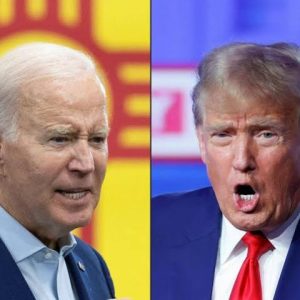Though Wall Street thinks Donald Trump still has a good chance of winning the November election and is speculating on the potential effects of a second term for the Republican candidate on markets, Trump became the first former president to be found guilty of a felony last week.
Investors predicted that a Trump win would strengthen the dollar and the stock market overall. However, they added, his suggested tariffs and prolonged tax cuts might potentially fuel inflation and damage US government bonds.
Market players stated that it was still too early to determine how Trump’s conviction for forging documents to conceal a payment to a porn star will impact his chances of winning the presidency. Trump said he will appeal the decision, but it doesn’t stop the former president from running for office.
According to recent polls, Trump and Democratic presidential candidate Joe Biden are almost even in the election, which some predict may be influenced more by macroeconomic than by political reasons.
It appears that investors are preparing for political unpredictability as the options market is pricing an increase in volatility around the vote. Here’s an early look at the potential effects of Trump 2.0 on equities, bonds, and currencies according to investors.
During Trump’s first term, which saw tax cuts and infrastructure expenditure along with a trade war with China and the beginning of the COVID-19 epidemic, the S&P 500 increased by 68%. Under Biden, the benchmark index has increased by 38% so far. The S&P 500, which has gained almost 9% so far this year, has increased along with Trump’s election odds this year, according to data from betting site Predictit, according to a study released by LPL Financial on Friday.
The analysis also revealed that since February, Biden’s chances of winning the presidency have continued to be inversely connected with the S&P 500. Some investors think that a second term for Trump may be advantageous for the stock market, particularly if he can prevent the tax increases that Biden had pledged. A lot would rely on the composition of congress
“A corporate tax hike is off the table in a Trump administration with a divided Congress or with a Republican clean sweep,” stated Sonu Varghese, global macro strategist at Carson Group. A Reuters story claims that a second Trump White House will aim to weaken the authority of US banking regulators.
That might be another benefit for stocks, particularly for small-cap firms, which might find it more costly to meet regulatory standards, according to Federated Hermes’ chief investment officer for equities Stephen Auth. An further factor that could improve mood in the energy industry is Trump’s pledge to support the production of fossil fuels and a more business-friendly approach to environmental regulation, according to a Nomura analysis.
Trade disputes and tariffs, on the other hand, could be spoilers. In an attempt to close the trade deficit with China, Trump has proposed 10% universal taxes on goods from all origins and tariffs of 60% or more on all Chinese imports. Trade protectionism, according to experts at Deutsche Bank, may have the effect of a “negative supply shock,” increasing profits at the expense of slower growth and higher inflation.
According to Carson’s Varghese, multinational corporations who have strong supply chain ties to China or that generate revenue from there may also be at risk.
Trump’s “pro growth, anti-inflation economic policies will quickly bring down prices, reduce interest rates, and lower long-term debt levels, which will benefit all Americans, includinginvestor” according to a statement released by his national press secretary during the campaign, Karoline Leavitt.










